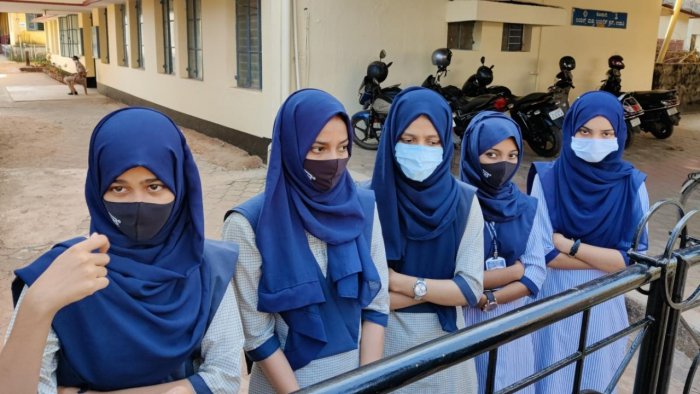Palestinian prisoner transferred to solitary confinement by Israeli forces due to hunger strike
- 19-05-2020
- News

On 5th February 2022, Karnataka government circulated an order in which it mandated the school uniform for all students in all government schools and colleges. Government quoted section 133(2) of Karnataka Education Law, 1983. It stated that students will have to wear the dress chosen by the college development committee or the appellate committee of the administrative board of pre-university colleges which come under the pre-university education department.
How did the controversy begin?
In a pre-university college of Udupi district in Karnataka, 6 students have filed a petition saying that wearing Hijab is their constitutional right and their college is not allowing them to wear it in college premises. Sanjay Hegde is the lawyer by the side of girls in this case.
The matter was assigned to Karnataka High Court single bench. Later this case was referred to a larger bench of 3 judges. On 10th February, the larger bench adjourned the court until the next hearing on 14th February, 2022. Karnataka government has closed all schools and colleges till 15th February regarding sensitivity of the issue.
Sanjay Hegde by the side of petitioners argued that Article 19(1) allows everyone to wear what they want to wear and this right can be restricted only by Article 19(6). Wearing a headscarf is important as per the sacred Quraan. The decisions of government cannot abridge these rights.
Next day, when girls wearing headscarves reached the school, some boys also reached there wearing saffron shawls demanding equal treatment and the same uniform for all. Boys heckled and sloganeered “Jai Shri Ram”, in response to that, a girl wearing burqa also heckled “Allahu Akbar”. After this, protests have spread all over the country in favor and against this matter. Some trivial incidents of violence have been reported.
Chief justice of Karnataka High court, Ritu Raj Awasthi signaled to both the parties of this case that the court will pass an interim order for starting the educational institutions and not wearing saffron shawls or head scarves till the bench decides its case. The Chief Justice also urged people to maintain peace and tranquility as the court will decide matters on the basis of constitution only. Court has decided to hear the case on a day-to-day basis.
Politics on this matter
After politicians like Asaduddin Owaisi praised the girl for showing courage and Priyanka Gandhi’s statement - “Bikini, Ghoonghat or Hijab- It's a Women’s Right”, the matter took a political turn.
Nobel laureate Malala Yousafzai has intensified the matter by posting the picture and tweeting that ‘they were not allowed to enter campuses and classrooms wearing the hijab in Karnataka’. She added that ‘refusing to let girls go to school in their hijabs is horrifying’.
The matter can have a significant impact on the ongoing UP elections, where all political parties try to spoil the peace and tranquility of the region with topics of castes and religion to take advantage in elections.
Any previous judgment regarding this matter?
In 2003, Fatima Hussain Syed vs Bharat Education Society and Others, Bombay High Court ruled that the principal to prohibit the wearing of head scarf or head covering in the school is not a violation of Article 25.
Article 25 –Freedom of conscience and free profession, practice and propagation of religion.
Article 25(1)- wearing kirpans shall be deemed to be included in the profession of the Sikh religion.
In 2016, Amna Bashir vs CBSE case, Kerala High Court had given a verdict where two Muslim girls were allowed to appear in the CBSE AIPMT exam waring hijab. High Court has ruled that wearing hijab is a part of Islam and thus it should be allowed.
In 2018, Fatima Thasneem vs State of Kerala, a single bench of Kerala High Court ruled that an individual's interest must yield to the larger public interest. It is for the institution to decide the dress code for students; if a student does not wish to abide by the dress code, they can seek a transfer certificate.
What is the provision in other countries regarding this?
In France, any kind of religious dress was banned in school in 2004, and later in 2010, wearing hijab at public places was also banned. In Denmark also, covering faces at public places has been banned since 2018. The Netherlands, Belgium, Bulgaria and many more countries have banned covering their faces at public places. Even in Syria and Egypt also, covering faces at educational institutes has been banned since 2010.
The Quraan instructs women to cover their heads at public places. But whether they have the right to wear hijab or cover face in educational institutes also, is a matter of legal discussion for the Kerala High Court for now.
In the meanwhile, the honorable Supreme Court has assured that it will enter at the appropriate time. It has assured protection of fundamental rights of people.